20 sept 2014
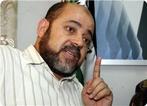
Member of Hamas's political bureau Mousa Abu Marzouk said that his Movement does not want another war with Israel, but another round of fighting could be inevitable unless there was an agreement to end the closure of Gaza crossings. In press remarks to Associated Press, Abu Marzouk warned that the failure to negotiate an agreement ending the blockade on Gaza would lead to another war.
"We do not want that and I believe that the Israelis also do not want to see another war," the Hamas official stated.
"The Gaza people lived a difficult situation before the war as a result of the blockade, and we cannot put them in a similar situation after the war. The Israelis have to change their policy," he added.
"We do not want that and I believe that the Israelis also do not want to see another war," the Hamas official stated.
"The Gaza people lived a difficult situation before the war as a result of the blockade, and we cannot put them in a similar situation after the war. The Israelis have to change their policy," he added.
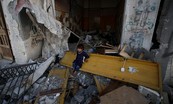
The Palestinian cabinet has approved a $5 billion plan for the economic revival and reconstruction of the Gaza Strip, in the wake of the recent Israeli assault, according to a senior official.
"We will seek to collect international donations in order to materialize our ambitious vision of rebuilding Gaza during the donor countries conference scheduled to be held in Cairo on Oct. 12," Deputy Prime Minister Muhammad Mustafa stated Saturday.
According to a report by Ma'an News Agency, the rehabilitation of infrastructure in Gaza will cost $1.9 billion, while reconstruction and rehabilitation of houses will cost another billion.
Approximately $700 million will be needed for humanitarian, social, health, and education aid for Palestinians in Gaza. Many lost homes and family members and some have become severely disabled as a result of the war.
See VIDEO: Gaza City's Devastated Al-Shuja'eyya Suburb
Furthermore, it is reported that another $1.2 billion will be needed to reactivate Gaza's economy and increase productivity, while governmental institutions are requiring some $200 million to improve employment capacities.
This plan was prepared by a committee of 200 experts representing 20 national bodies, including ministries and institutions, the majority of whom are based in Gaza.
According to Mr. Mustafa, the plan was three times more intensive than a similar plan in 2009, crafted by the Palestinian Authority, following Operation Cast Lead.
See also: Gaza Reconstruction to Cost $7.8 Billion
UN Brokers Privatized Gaza Reconstruction Deal
"We will seek to collect international donations in order to materialize our ambitious vision of rebuilding Gaza during the donor countries conference scheduled to be held in Cairo on Oct. 12," Deputy Prime Minister Muhammad Mustafa stated Saturday.
According to a report by Ma'an News Agency, the rehabilitation of infrastructure in Gaza will cost $1.9 billion, while reconstruction and rehabilitation of houses will cost another billion.
Approximately $700 million will be needed for humanitarian, social, health, and education aid for Palestinians in Gaza. Many lost homes and family members and some have become severely disabled as a result of the war.
See VIDEO: Gaza City's Devastated Al-Shuja'eyya Suburb
Furthermore, it is reported that another $1.2 billion will be needed to reactivate Gaza's economy and increase productivity, while governmental institutions are requiring some $200 million to improve employment capacities.
This plan was prepared by a committee of 200 experts representing 20 national bodies, including ministries and institutions, the majority of whom are based in Gaza.
According to Mr. Mustafa, the plan was three times more intensive than a similar plan in 2009, crafted by the Palestinian Authority, following Operation Cast Lead.
See also: Gaza Reconstruction to Cost $7.8 Billion
UN Brokers Privatized Gaza Reconstruction Deal

French President Francois Hollande declared on Friday during a joint press conference with PA chairman Mahmoud Abbas in Paris that France would present a resolution to the United Nations Security Council calling for a solution to the Israeli-Palestinian conflict. “We will have a resolution, to be presented to the Security Council, that will say very clearly what we expect from the (peace) process and what the solution to the conflict must be,” according to Hollande's statement.
"There is a perception that there will never be a solution to end the Israeli-Palestinian conflict, even though we know the outlines” of a possible agreement, he said.
This is the third time that Gaza has been destroyed, Hollande underlined. "What we must look for is a durable peace accord," he said, adding that stalled peace talks "must now reach their end".
For his part, Abbas called on "all states to assume their responsibilities to put an end to the conflict ongoing for more than 66 years," stressing that "peace-making would give greater legitimacy to combat terrorism in the region."
Abbas, who is seeking to rally support before the announcement of a new Palestinian diplomatic initiative in the United Nations, said that "France can press for an international mobilization for the implementation of the Arab initiative."
Abbas has recently won Arab League support for his plan calling for an end to Israeli occupation of the Palestinian territories within three years and the formation of a Palestinian state based on 1967 borders.
Abbas is to scheduled travel from Paris to New York within two days to participate in the annual UN General Assembly session starting September 24. He is slated to deliver a speech at the meeting.
"There is a perception that there will never be a solution to end the Israeli-Palestinian conflict, even though we know the outlines” of a possible agreement, he said.
This is the third time that Gaza has been destroyed, Hollande underlined. "What we must look for is a durable peace accord," he said, adding that stalled peace talks "must now reach their end".
For his part, Abbas called on "all states to assume their responsibilities to put an end to the conflict ongoing for more than 66 years," stressing that "peace-making would give greater legitimacy to combat terrorism in the region."
Abbas, who is seeking to rally support before the announcement of a new Palestinian diplomatic initiative in the United Nations, said that "France can press for an international mobilization for the implementation of the Arab initiative."
Abbas has recently won Arab League support for his plan calling for an end to Israeli occupation of the Palestinian territories within three years and the formation of a Palestinian state based on 1967 borders.
Abbas is to scheduled travel from Paris to New York within two days to participate in the annual UN General Assembly session starting September 24. He is slated to deliver a speech at the meeting.
19 sept 2014
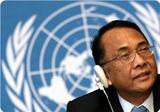
Head of the popular committee against the siege MP Jamal Al-Khudari strongly condemned the Israeli decision to prevent the new UN special reporter on the Palestinian occupied territories Makarim Wibisono from entering the Gaza Strip. MP Khudari said that such decision reflected Israel's disregard for the international law and its attempts to conceal the crimes its army had committed in the Gaza Strip.
"Such practices will never succeed in hisinf the truth and the criminal image of the Israeli occupation state," he added.
He also stressed the need to accelerate procedures to lift the inhumane siege on Gaza and pressure Israel in this regard.
"Such practices will never succeed in hisinf the truth and the criminal image of the Israeli occupation state," he added.
He also stressed the need to accelerate procedures to lift the inhumane siege on Gaza and pressure Israel in this regard.
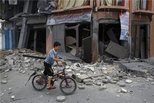
Three Palestinians have been killed and three injured, on Friday, when an unexploded Israeli weapon detonated in the al-Shuja'eyya neighborhood of eastern Gaza City.
Ma'an correspondence in Gaza said that a huge explosion was heard in Shuja'eyya and that ambulances immediately rushed to the area.
Dr. Ashraf al-Qidra, spokesperson for the Palestinian Ministry of Health in Gaza, said that two Palestinians were killed in the explosion.
The three were identified as Ayman Ziad Abu Jibba and Abdullah Jibril Abu Aser, both 23 years of age, and Mohammad Riyadh Abu Aser, 24; their bodies were taken to al-Shifa hospital, in Gaza City.
In mid-August, six people were killed in a similar explosion. Watch groups have warned that the unexploded ordnance is a particular threat to children, who often play with the weapons as if they were toys.
According to Ma'an, a 2012 report published by the Office of the High Commissioner for Human Rights said that 111 civilians, 64 of whom were children, died as a result of unexploded ordnance between 2009 and 2012 -- an average of four every month, in 2012.
Although explosives teams have been working across the region to disable and destroy unexploded weapons, a lack of proper equipment and resources, due to the seven-year siege on the coastal enclave, have considerably hindered such efforts.
Ma'an correspondence in Gaza said that a huge explosion was heard in Shuja'eyya and that ambulances immediately rushed to the area.
Dr. Ashraf al-Qidra, spokesperson for the Palestinian Ministry of Health in Gaza, said that two Palestinians were killed in the explosion.
The three were identified as Ayman Ziad Abu Jibba and Abdullah Jibril Abu Aser, both 23 years of age, and Mohammad Riyadh Abu Aser, 24; their bodies were taken to al-Shifa hospital, in Gaza City.
In mid-August, six people were killed in a similar explosion. Watch groups have warned that the unexploded ordnance is a particular threat to children, who often play with the weapons as if they were toys.
According to Ma'an, a 2012 report published by the Office of the High Commissioner for Human Rights said that 111 civilians, 64 of whom were children, died as a result of unexploded ordnance between 2009 and 2012 -- an average of four every month, in 2012.
Although explosives teams have been working across the region to disable and destroy unexploded weapons, a lack of proper equipment and resources, due to the seven-year siege on the coastal enclave, have considerably hindered such efforts.
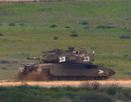
Several Israeli military vehicles carried out, on Friday morning, a limited invasion into al-Qarara town, east of Khan Younis district, in the southern part of the Gaza Strip.
Local sources said that a number of vehicles, and four army bulldozers stationed at the Kissufim military base, near the Gaza border fence, advanced around 100 meters into Palestinian agricultural lands.
The army carries out repeated invasions into border areas in the Gaza Strip, bulldozes and uproots farmlands, and in many cases opens fire at random in an attempt to force the farmers and workers to leave their lands, close to the border fence.
The Israeli Navi also continued its violations against the fishermen, and their boats, in Gaza waters, in direct violation of the latest ceasefire agreement, and many earlier ceasefire deals.
Local sources said that a number of vehicles, and four army bulldozers stationed at the Kissufim military base, near the Gaza border fence, advanced around 100 meters into Palestinian agricultural lands.
The army carries out repeated invasions into border areas in the Gaza Strip, bulldozes and uproots farmlands, and in many cases opens fire at random in an attempt to force the farmers and workers to leave their lands, close to the border fence.
The Israeli Navi also continued its violations against the fishermen, and their boats, in Gaza waters, in direct violation of the latest ceasefire agreement, and many earlier ceasefire deals.
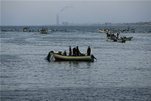
Israeli naval forces opened fire off the coast of northern Gaza, late Wednesday, injuring a Palestinian fisherman, according to local reports.
Ma'an News Agency reports that one Yousef Zayif, age 70, was hit by live fire while waiting for his sons on the shore of a beach near al-Sudaniya.
Medics described his injuries as "moderate", while the Israeli army did not return calls seeking comment.
M'an further reports that, on Sunday, an Israeli warship opened fire at Palestinian fishermen off the coast of Gaza City's al-Shati refugee camp.
Speaker for the Union of Gaza Fishermen, Nizar Ayyash, told Ma'an that Israeli gunboats "have been firing at fishermen every day since the ceasefire agreement was signed."
He also said that naval forces have detained six Palestinian fishermen since the truce was first called in August.
Furthermore, the Israeli blockade in place since 2006 -- and backed by Egypt since 2007 -- has severely limited imports and exports within the Gaza Strip, and has led to frequent humanitarian crises and hardship for Gazans.
Ma'an News Agency reports that one Yousef Zayif, age 70, was hit by live fire while waiting for his sons on the shore of a beach near al-Sudaniya.
Medics described his injuries as "moderate", while the Israeli army did not return calls seeking comment.
M'an further reports that, on Sunday, an Israeli warship opened fire at Palestinian fishermen off the coast of Gaza City's al-Shati refugee camp.
Speaker for the Union of Gaza Fishermen, Nizar Ayyash, told Ma'an that Israeli gunboats "have been firing at fishermen every day since the ceasefire agreement was signed."
He also said that naval forces have detained six Palestinian fishermen since the truce was first called in August.
Furthermore, the Israeli blockade in place since 2006 -- and backed by Egypt since 2007 -- has severely limited imports and exports within the Gaza Strip, and has led to frequent humanitarian crises and hardship for Gazans.
18 sept 2014
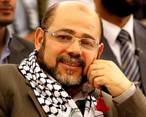
Mousa Abumarzook
Dr. Mousa Abumarzook, a political leader of the Hamas movement, stated that indirect post ceasefire talks between Israel and the resistance in Gaza would resume, under Egyptian mediation in Cairo, before September 24.
Abumarzook said that although the exact date of resuming the talks has not been set yet; it will definitely be before the 24th.
The Hamas official said the United Nations, in coordination with Tel Aviv and the Palestinian unity government, would handle the reconstruction of Gaza, and that there will be observers and a schedule for the entry of construction materials.
Abumarzook further said the Hamas movement has no objection or reservations on any mechanism, set by the United Nations, to ensure the entry of the urgently needed construction materials.
Commenting on an anticipated meeting between officials of Fateh and Hamas movement, the official said that he is awaiting a call from the head of the Fateh delegation, Azzam al-Ahmad, in which a time, date and place of the meeting would be determined.
“Hamas has no reservation on holding the meeting in Cairo," he said. “Should Cairo made a decision, we will hold the meeting there; otherwise, we will hold it in Gaza.”
He said that he held meetings with UN officials and officials of the Palestinian Authority, in an attempt to speed the reconstruction of Gaza.
As for the issue of the unpaid salaries of more than 40.000 employees of the former government in Gaza, the official said there is no justification for the overdue salaries, and demanded that they receive the same treatment which current unity government employees receive.
“There file will be discussed during the upcoming meeting in Cairo,” he said.
Dr. Mousa Abumarzook, a political leader of the Hamas movement, stated that indirect post ceasefire talks between Israel and the resistance in Gaza would resume, under Egyptian mediation in Cairo, before September 24.
Abumarzook said that although the exact date of resuming the talks has not been set yet; it will definitely be before the 24th.
The Hamas official said the United Nations, in coordination with Tel Aviv and the Palestinian unity government, would handle the reconstruction of Gaza, and that there will be observers and a schedule for the entry of construction materials.
Abumarzook further said the Hamas movement has no objection or reservations on any mechanism, set by the United Nations, to ensure the entry of the urgently needed construction materials.
Commenting on an anticipated meeting between officials of Fateh and Hamas movement, the official said that he is awaiting a call from the head of the Fateh delegation, Azzam al-Ahmad, in which a time, date and place of the meeting would be determined.
“Hamas has no reservation on holding the meeting in Cairo," he said. “Should Cairo made a decision, we will hold the meeting there; otherwise, we will hold it in Gaza.”
He said that he held meetings with UN officials and officials of the Palestinian Authority, in an attempt to speed the reconstruction of Gaza.
As for the issue of the unpaid salaries of more than 40.000 employees of the former government in Gaza, the official said there is no justification for the overdue salaries, and demanded that they receive the same treatment which current unity government employees receive.
“There file will be discussed during the upcoming meeting in Cairo,” he said.
17 sept 2014
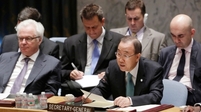
The Israeli Foreign Ministry has expressed a refusal to cooperate with the fact-finding mission with regard to the recent Israeli assault on the Gaza Strip coordinated by the Human Rights Council of the United Nations, say Israeli reports.
According to Al Ray Palestinian Media Agency, the Ministry recently made recommendations not to cooperate with the UN mission.
Israeli daily Yediot Ahronot reported that the Israeli Foreign Ministry wonders if it should cooperate with a fact finding mission which relies on an "anti-Israeli majority".
The sources said that "Israel did not cooperate with Goldstone. As a result, his report was disappeared.”
The Goldstone Commission report on the Israeli military aggression on Gaza from 2008-2009 accused Israel of committing war crimes in the Gaza Strip, in which nearly 1,400 Palestinians were killed, most of whom were civilians.
For more information on this, see: 07/13/14 Jews Against Genocide Hold Memorial for Palestinian Children at Yad Vashem
Over 2,000 Palestinians have been killed and more than 10,000 others injured, during the most recent assault, in over a month of devastating Israeli attacks on the besieged Gaza Strip, beginning in the first week of July.
According to Al Ray Palestinian Media Agency, the Ministry recently made recommendations not to cooperate with the UN mission.
Israeli daily Yediot Ahronot reported that the Israeli Foreign Ministry wonders if it should cooperate with a fact finding mission which relies on an "anti-Israeli majority".
The sources said that "Israel did not cooperate with Goldstone. As a result, his report was disappeared.”
The Goldstone Commission report on the Israeli military aggression on Gaza from 2008-2009 accused Israel of committing war crimes in the Gaza Strip, in which nearly 1,400 Palestinians were killed, most of whom were civilians.
For more information on this, see: 07/13/14 Jews Against Genocide Hold Memorial for Palestinian Children at Yad Vashem
Over 2,000 Palestinians have been killed and more than 10,000 others injured, during the most recent assault, in over a month of devastating Israeli attacks on the besieged Gaza Strip, beginning in the first week of July.

Jamal al-Khudari, Palestinian MP and head of the popular committee against the siege, raised in a statement on Tuesday alarm bells over the “tragic” state of affairs in Gaza, wrought by the 51-day-long Israeli offensive and the notorious seven-year siege. Khudari attributed in a statement on Tuesday the crisis to the quasi-total breakdown in Gaza’s basic services, including power, water, and sewage network along with Israel’s destruction of civilian homes and its atrocious genocides against innocent children.
The situation forced hundreds of displaced and homeless families to seek refuge in relief shelters, where they have been disastrously devoid of their basic humanitarian needs.
Khudari drew attention to the exacerbating humanitarian crisis embodied in the unprecedented upsurge in unemployment, homelessness and poverty rates. More than 90% are currently living below the poverty line with an average per capita income of less than 2 dollars per day.
95% of Gaza’s water is unsuitable for human consumption. The sea has also become very contaminated as a daily sum of 40 million liters of untreated wastewater as sewage flows directly into the sea.
The infrastructure has also had more than its fair share of damage over the past few years, due to the tough blockade under which the Strip has been made to endure. As soon as Israel initiated its ferocious military campaign on Gaza, the situation has gone remarkably downhill.
Khudari raised concerns over the relapse wrought on Gaza’s environment as the soil has become unfertile for cultivation due to the heavy barrages of rocket fire and random shelling targeting Palestinians’ agricultural lands and crops.
Israel’s pre-planned targeting of Gaza’s power plant has deepened the humanitarian crisis in the besieged enclave.
Khudari called on the international community and humanitarian institutions, nationwide and overseas, to immediately step in and provide urgent assistance and solutions to work out the humanitarian crisis in the Gaza Strip, boost up the reconstruction process, and shelter the hundreds of homeless families.
He further hailed the relief institutions that have stood by Gazans and provided them with the urgent medical assistance both during the offensive and post-offensive phases.
The situation forced hundreds of displaced and homeless families to seek refuge in relief shelters, where they have been disastrously devoid of their basic humanitarian needs.
Khudari drew attention to the exacerbating humanitarian crisis embodied in the unprecedented upsurge in unemployment, homelessness and poverty rates. More than 90% are currently living below the poverty line with an average per capita income of less than 2 dollars per day.
95% of Gaza’s water is unsuitable for human consumption. The sea has also become very contaminated as a daily sum of 40 million liters of untreated wastewater as sewage flows directly into the sea.
The infrastructure has also had more than its fair share of damage over the past few years, due to the tough blockade under which the Strip has been made to endure. As soon as Israel initiated its ferocious military campaign on Gaza, the situation has gone remarkably downhill.
Khudari raised concerns over the relapse wrought on Gaza’s environment as the soil has become unfertile for cultivation due to the heavy barrages of rocket fire and random shelling targeting Palestinians’ agricultural lands and crops.
Israel’s pre-planned targeting of Gaza’s power plant has deepened the humanitarian crisis in the besieged enclave.
Khudari called on the international community and humanitarian institutions, nationwide and overseas, to immediately step in and provide urgent assistance and solutions to work out the humanitarian crisis in the Gaza Strip, boost up the reconstruction process, and shelter the hundreds of homeless families.
He further hailed the relief institutions that have stood by Gazans and provided them with the urgent medical assistance both during the offensive and post-offensive phases.
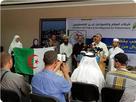
Ala al-Din al-Batta, head of the Palestinian governmental committee for lifting the siege and hosting delegations, spoke out against the remarkable downturn in the influx of solidarity and humanitarian convoys into besieged Gaza. Al-Batta said in a statement on Tuesday that Gaza has only received 14 solidarity convoys, comprising some 104 volunteers, via the Rafah crossing.
According to al-Batta, the current pace of Gaza’s solidarity envoys lags far behind the rates recorded in the wake of the 2012 offensive, when more than 60 relief convoys, comprising at least 1,600 members, were dispatched to Gaza.
Five Emirati aid convoys, along with a number of solidarity delegates from Tunisia, Turkey, Malaysia, Sudan and Palestinians in Europe, dropped by Gaza so far, he added.
The Egyptian authorities denied dozens of medical and humanitarian solidarity convoys, most notably a convoy comprising 500 revolutionary Egyptian activists, access into Gaza under flimsy pretexts
Al-Batta called on international and Arab parties to kit out emergency relief convoys and dispatch them to the besieged Strip in order to mitigate the agony of Gaza’s casualties and contribute in lifting the enforced blockade.
He further expressed hopes that the Egyptian authorities would smooth the access of humanitarian convoys into the Gaza Strip.
According to al-Batta, the current pace of Gaza’s solidarity envoys lags far behind the rates recorded in the wake of the 2012 offensive, when more than 60 relief convoys, comprising at least 1,600 members, were dispatched to Gaza.
Five Emirati aid convoys, along with a number of solidarity delegates from Tunisia, Turkey, Malaysia, Sudan and Palestinians in Europe, dropped by Gaza so far, he added.
The Egyptian authorities denied dozens of medical and humanitarian solidarity convoys, most notably a convoy comprising 500 revolutionary Egyptian activists, access into Gaza under flimsy pretexts
Al-Batta called on international and Arab parties to kit out emergency relief convoys and dispatch them to the besieged Strip in order to mitigate the agony of Gaza’s casualties and contribute in lifting the enforced blockade.
He further expressed hopes that the Egyptian authorities would smooth the access of humanitarian convoys into the Gaza Strip.

The international Food and Agriculture Organization has asked for urgent aid to Gaza Strip’s agriculture sector to the tune of 32 million dollars. The organization said in a statement on Tuesday that there was an urgent need for helping the farmers in Gaza to reclaim their land and resume farming in addition to repairing irrigation networks and wells.
Israel launched fierce attacks on Gaza for 51 days starting July 7 that killed 2,158 people and wounded more than 11,000 others while inflicting vast damage to the Strip’s infrastructure, civilian houses, mosques, factories, farmland, schools, hospitals and government buildings.
Israel launched fierce attacks on Gaza for 51 days starting July 7 that killed 2,158 people and wounded more than 11,000 others while inflicting vast damage to the Strip’s infrastructure, civilian houses, mosques, factories, farmland, schools, hospitals and government buildings.
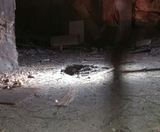
According to Israeli security sources, the Hamas movement in Gaza has arrested an armed group that fired a shell into the Eshkol Regional Council of Settlement.
The shell did not cause any damage or injury.
Israeli daily Maariv quoted the sources stating Israel indirectly sent a message to Hamas demanding the arrest of those behind the firing the shell, adding that Israel threatened to retaliate should no action be taken.
It said the Hamas movement responded to the message, and arrested the group.
According to the report, Hamas affirmed its commitment to the ceasefire agreement, and that it will arrest any group that violates the truce.
Israel Ynet News said the group behind the incident is believed to be a “rebellious faction”, adding that Israel threatened that should Hamas fail to act, “it will have to act and retaliate."
On its part, Hamas denied any knowledge of the mortar attack, and said it is fully committed to the truce that was reached on August 26.
The movement said it will not allow any group to violate the truce in any way, shape of form.
The shell did not cause any damage or injury.
Israeli daily Maariv quoted the sources stating Israel indirectly sent a message to Hamas demanding the arrest of those behind the firing the shell, adding that Israel threatened to retaliate should no action be taken.
It said the Hamas movement responded to the message, and arrested the group.
According to the report, Hamas affirmed its commitment to the ceasefire agreement, and that it will arrest any group that violates the truce.
Israel Ynet News said the group behind the incident is believed to be a “rebellious faction”, adding that Israel threatened that should Hamas fail to act, “it will have to act and retaliate."
On its part, Hamas denied any knowledge of the mortar attack, and said it is fully committed to the truce that was reached on August 26.
The movement said it will not allow any group to violate the truce in any way, shape of form.
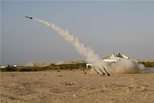
Palestinians fired a mortar round into southern Israel Tuesday in the first attack since an Aug. 26 ceasefire, without causing any casualties, the Israeli army said.
"For the first time since operation Protective Edge, a mortar shell fired from Gaza hit southern Israel," Lieutenant Colonel Peter Lerner said on Twitter, referring to the military offensive in Gaza.
"No damage or injuries reported," he added.
In July, Israel launched the operation with the declared aim of halting rocket fire from the Gaza Strip. An ensuing 50-day war with militants killed at least 2,143 Palestinians, nearly 70 percent of them civilians, and 73 people on the Israeli side.
The sides, working through Egyptian mediators, are supposed to start negotiations in Cairo this month to agree a more formal and long-term version of the existing open-ended truce.
Earlier Tuesday, Israel confirmed that it had signed up to a United Nations-brokered deal to facilitate reconstruction of the shattered coastal strip while keeping materials out of the hands of Hamas militants.
"Israel has agreed to the proposal of the United Nations to establish a mechanism for rehabilitation of the Gaza Strip under the supervision and control of the UN," the defense ministry's department for civil affairs in the Palestinian territories said.
"The mechanism will facilitate progress in rebuilding the Gaza Strip while safeguarding the security interests of the state of Israel."
"For the first time since operation Protective Edge, a mortar shell fired from Gaza hit southern Israel," Lieutenant Colonel Peter Lerner said on Twitter, referring to the military offensive in Gaza.
"No damage or injuries reported," he added.
In July, Israel launched the operation with the declared aim of halting rocket fire from the Gaza Strip. An ensuing 50-day war with militants killed at least 2,143 Palestinians, nearly 70 percent of them civilians, and 73 people on the Israeli side.
The sides, working through Egyptian mediators, are supposed to start negotiations in Cairo this month to agree a more formal and long-term version of the existing open-ended truce.
Earlier Tuesday, Israel confirmed that it had signed up to a United Nations-brokered deal to facilitate reconstruction of the shattered coastal strip while keeping materials out of the hands of Hamas militants.
"Israel has agreed to the proposal of the United Nations to establish a mechanism for rehabilitation of the Gaza Strip under the supervision and control of the UN," the defense ministry's department for civil affairs in the Palestinian territories said.
"The mechanism will facilitate progress in rebuilding the Gaza Strip while safeguarding the security interests of the state of Israel."
16 sept 2014

Bennett and Rabbi Rontzki
Brig. Gen. (res.) Rontzki relieved from reserve duty for supplying classified information to Bayit Yehudi Chairman Bennett.
Brig. Gen. (res.) Avichai Rontzki, the former Chief IDF Rabbi, was dismissed from reserve duty after providing Economy Minister Naftali Bennett with classified information during Operation Protective Edge, it was revealed Tuesday.
According to reports, Rontzki passed Bennett information on orders given to soldiers on how to deal with the tunnels threat.
An investigation conducted within the defense establishment revealed Rontzki's actions and he was personally disciplined by the IDF Chief of Staff Benny Gantz. The IDF Spokesman's Office said that "for obvious reasons, we will not address internal discussions the chief of staff holds."
The IDF Spokesman's Office also refused to explain how it is possible for a citizen to in reserve duty to put on his uniforms of his own accord and attended sensitive operational briefings. Rontzki, who is currently abroad, denied the reports. "This never was and never existed. I'm a close friend of Bennett's, but the friendship is not a secret.
I've never provided him with information from the IDF. This is the first time I'm hearing these claims. The chief of staff and defense minister know me personally and no one told me I was dismissed from reserve duty. I was even called for duty after Protective Edge." Defense Minister Moshe Ya'alon criticized the conduct of some of the members of the Security Cabinet during the Gaza operation.
"I hope the cabinet ministers have learned their lesson," he said. "Their conduct led to a heavy price during the fighting. The other side saw how we were close to crumbling and dividing. Under no circumstances can ministers speak to officers without my permission and knowledge. There was such communications, but it's illegitimate, inappropriate and was handled," Ya'alon added.
Sources in Bennett's office responded harshly to the accusations against the economy minister, claiming that "the anonymous slander is a disgrace.
Minister Bennett is proud of his actions that have led to the operation against the tunnels and saved lives. Minister Bennett's actions during Protective Edge, in the midst of the failure to treat the tunnel threat, saved the residents of Netiv HaAsara and Nahal Oz."
"For many weeks, while Bennett demanded over and over again to go on a campaign for the destruction of the tunnels, there were security-political elements that stopped his initiative and dismissed the threat, which left the southern community exposed to a strategic terror attack. This is what is expected (of Bennett) and this is an appropriate behavior for a member of Israel's Security Cabinet."
Brig. Gen. (res.) Rontzki relieved from reserve duty for supplying classified information to Bayit Yehudi Chairman Bennett.
Brig. Gen. (res.) Avichai Rontzki, the former Chief IDF Rabbi, was dismissed from reserve duty after providing Economy Minister Naftali Bennett with classified information during Operation Protective Edge, it was revealed Tuesday.
According to reports, Rontzki passed Bennett information on orders given to soldiers on how to deal with the tunnels threat.
An investigation conducted within the defense establishment revealed Rontzki's actions and he was personally disciplined by the IDF Chief of Staff Benny Gantz. The IDF Spokesman's Office said that "for obvious reasons, we will not address internal discussions the chief of staff holds."
The IDF Spokesman's Office also refused to explain how it is possible for a citizen to in reserve duty to put on his uniforms of his own accord and attended sensitive operational briefings. Rontzki, who is currently abroad, denied the reports. "This never was and never existed. I'm a close friend of Bennett's, but the friendship is not a secret.
I've never provided him with information from the IDF. This is the first time I'm hearing these claims. The chief of staff and defense minister know me personally and no one told me I was dismissed from reserve duty. I was even called for duty after Protective Edge." Defense Minister Moshe Ya'alon criticized the conduct of some of the members of the Security Cabinet during the Gaza operation.
"I hope the cabinet ministers have learned their lesson," he said. "Their conduct led to a heavy price during the fighting. The other side saw how we were close to crumbling and dividing. Under no circumstances can ministers speak to officers without my permission and knowledge. There was such communications, but it's illegitimate, inappropriate and was handled," Ya'alon added.
Sources in Bennett's office responded harshly to the accusations against the economy minister, claiming that "the anonymous slander is a disgrace.
Minister Bennett is proud of his actions that have led to the operation against the tunnels and saved lives. Minister Bennett's actions during Protective Edge, in the midst of the failure to treat the tunnel threat, saved the residents of Netiv HaAsara and Nahal Oz."
"For many weeks, while Bennett demanded over and over again to go on a campaign for the destruction of the tunnels, there were security-political elements that stopped his initiative and dismissed the threat, which left the southern community exposed to a strategic terror attack. This is what is expected (of Bennett) and this is an appropriate behavior for a member of Israel's Security Cabinet."
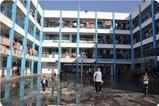
The Palestinian ministry of education said that 538 educational institutions sustained total damage of more than 33 million dollars during the last Israeli war on the Gaza Strip. This came in a detailed report released by the general directorate of buildings and projects at the ministry.
The report provides information on the financial losses that were inflicted on the educational sector during 51 days of military aggression against Gaza.
According to this report, the affected education institutions include, public and UNRWA schools, kindergartens, and public and private higher education facilities.
The report provides information on the financial losses that were inflicted on the educational sector during 51 days of military aggression against Gaza.
According to this report, the affected education institutions include, public and UNRWA schools, kindergartens, and public and private higher education facilities.
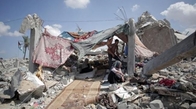
The United Nations has brokered an Israeli-Palestinian deal on imports of construction materials to Gaza to ensure they will not be diverted by Hamas militants, an envoy said Tuesday. The agreement on monitoring the supply of materials "must get up and running without delay," said Robert Serry, the U.N. envoy for the Middle East.
The deal, announced by Serry at a U.N. Security Council meeting, would allow private companies to move in to rebuild Gaza after a recent 50-day war ravaged the enclave and left more than 2,140 Palestinians dead.
It addresses Israel's concerns that cement and other materials could be used to rebuild Hamas tunnels by setting up a U.N. monitoring mechanism of the imports.
Serry described the destruction in Gaza as "truly shocking," with some 18,000 houses flattened or severely damaged while 65,000 Palestinians remain in U.N.-run shelters and 100,000 are homeless.
He appealed for the re-opening of crossing points to allow the delivery of materials and emphasized that quick action on reconstruction would provide a "signal of hope to the people of Gaza."
Egypt is due to host a donor conference for Gaza reconstruction on October 12, supported by Norway.
"The crisis in Gaza is far from over and the window of opportunity to address critical needs and stabilize the situation is short," Serry warned.
The envoy appealed for action to "change fundamentally the dynamics in Gaza," warning that "if we do not, Gaza could implode - or, yet again, explode - possibly with a new and even more devastating round of violence."
Following weeks of Egyptian-brokered negotiations, Israel and Hamas agreed to halt their fire in Gaza on August 26 after 50 days, their deadliest confrontation in years.
The indirect talks are set to resume mid-September to discuss longer-term issues.
U.N. diplomats, however, are concerned about Israeli and Palestinian commitment to peace talks, with one Security Council member saying that the sides appeared to be drifting toward a "cold peace."
The council separately has been unable to agree on a draft resolution to shore up the Gaza truce.
The deal, announced by Serry at a U.N. Security Council meeting, would allow private companies to move in to rebuild Gaza after a recent 50-day war ravaged the enclave and left more than 2,140 Palestinians dead.
It addresses Israel's concerns that cement and other materials could be used to rebuild Hamas tunnels by setting up a U.N. monitoring mechanism of the imports.
Serry described the destruction in Gaza as "truly shocking," with some 18,000 houses flattened or severely damaged while 65,000 Palestinians remain in U.N.-run shelters and 100,000 are homeless.
He appealed for the re-opening of crossing points to allow the delivery of materials and emphasized that quick action on reconstruction would provide a "signal of hope to the people of Gaza."
Egypt is due to host a donor conference for Gaza reconstruction on October 12, supported by Norway.
"The crisis in Gaza is far from over and the window of opportunity to address critical needs and stabilize the situation is short," Serry warned.
The envoy appealed for action to "change fundamentally the dynamics in Gaza," warning that "if we do not, Gaza could implode - or, yet again, explode - possibly with a new and even more devastating round of violence."
Following weeks of Egyptian-brokered negotiations, Israel and Hamas agreed to halt their fire in Gaza on August 26 after 50 days, their deadliest confrontation in years.
The indirect talks are set to resume mid-September to discuss longer-term issues.
U.N. diplomats, however, are concerned about Israeli and Palestinian commitment to peace talks, with one Security Council member saying that the sides appeared to be drifting toward a "cold peace."
The council separately has been unable to agree on a draft resolution to shore up the Gaza truce.

The United Nations has brokered a deal on imports of construction materials into the Gaza Strip "to ensure they will not be diverted by Hamas", Mr. Robert Serry, UN envoy for the Middle East, said Tuesday.
According to AFP, the deal, announced at a UN Security Council meeting, will allow private companies to move into the region and rebuild Gaza, following the recent 50-day onslaught which ravaged the area and left over 2,000 Palestinians dead.
The deal reportedly addresses Israel's repeated assertation that cement and other materials could be used to rebuild Hamas tunnels, by setting up a UN monitoring mechanism of the imports.
The monitoring agreement must "get up and running without delay," said Serry.
He described the destruction in Gaza as "truly shocking," AFP reportsm with some 18,000 houses flattened or severely damaged while 65,000 Palestinians remain in UN-run shelters and 100,000 are homeless.
Related info and links: Human Rights Watch: Israel Likely to Have Committed War Crimes in Gaza
UN: Israel Used UNRWA School For Military Operations
Mr. Serry appealed for the re-opening of border crossing points, to allow the delivery of materials, emphasizing that quick action on reconstruction would provide a "signal of hope to the people of Gaza."
(The opening of the crossings is one condition of the ceasefire agreement.) See: 26 Post-ceasefire Violations Documented by Canadian-based Think Tank below
A donor conference for Gaza reconstruction is scheduled for Oct. 12, to be held in Egypt and supported by Norway. However, the UN Security Council has been unable to agree on a draft resolution for full implementation of the Gaza truce, for which further talks are scheduled in September.
According to AFP, the deal, announced at a UN Security Council meeting, will allow private companies to move into the region and rebuild Gaza, following the recent 50-day onslaught which ravaged the area and left over 2,000 Palestinians dead.
The deal reportedly addresses Israel's repeated assertation that cement and other materials could be used to rebuild Hamas tunnels, by setting up a UN monitoring mechanism of the imports.
The monitoring agreement must "get up and running without delay," said Serry.
He described the destruction in Gaza as "truly shocking," AFP reportsm with some 18,000 houses flattened or severely damaged while 65,000 Palestinians remain in UN-run shelters and 100,000 are homeless.
Related info and links: Human Rights Watch: Israel Likely to Have Committed War Crimes in Gaza
UN: Israel Used UNRWA School For Military Operations
Mr. Serry appealed for the re-opening of border crossing points, to allow the delivery of materials, emphasizing that quick action on reconstruction would provide a "signal of hope to the people of Gaza."
(The opening of the crossings is one condition of the ceasefire agreement.) See: 26 Post-ceasefire Violations Documented by Canadian-based Think Tank below
A donor conference for Gaza reconstruction is scheduled for Oct. 12, to be held in Egypt and supported by Norway. However, the UN Security Council has been unable to agree on a draft resolution for full implementation of the Gaza truce, for which further talks are scheduled in September.

On 26 August a ceasefire between Israel and Hamas was agreed, bringing a fragile end to a war that killed 2150 Palestinians (mostly civilians) and 73 Israelis (mostly soldiers). Since then Hamas has not fired a single rocket, attacked an Israeli target, or done anything to break the terms of the ceasefire. Israel has done the following:
1. Annexed another 1500 acres of West Bank land
2. Seized $56 million of PA tax revenue
3. Not lifted the illegal blockade (as required by the ceasefire)
4. Broken the ceasefire by firing at fishermen on four separate occasions
5. Detained six fishermen
6. Killed a 22-year-old, Issa al Qatari, a week before his wedding
7. Killed 16-year-old Mohammed Sinokrot with a rubber bullet to the head
8. Tortured a prisoner to the point of hospitalisation
9. Refused 13 members of the European Parliament entry into Gaza
10. Detained at least 127 people across the West Bank, including a seven-year-old boy in Hebron and two children, aged seven and eight, taken from the courtyard of their house in Silwad – and tear-gassed their mother
11. Continued to hold 33 members of the Palestinian Legislative Council in prison
12. Continued to hold 500 prisoners in administrative detention without charge or trial
13. Destroyed Bedouin homes in Khan al Ahmar, near Jerusalem, leaving 14 people homeless, and unveiled a plan to forcibly move thousands of Bedouin away from Jerusalem into two purpose-built townships
14. Destroyed a dairy factory in Hebron whose profits supported an orphanage
15. Destroyed a family home in Silwan, making five children homeless
16. Destroyed a house in Jerusalem where aid supplies en route to Gaza were being stored
17. Destroyed a well near Hebron
18. Set fire to an olive grove near Hebron
19. Raided a health centre and a nursery school in Nablus, causing extensive damage
20. Destroyed a swathe of farmland in Rafah by driving tanks over it
21. Ordered the dismantling of a small monument in Jerusalem to Mohamed Abu Khdeir, murdered in July by an Israeli lynch mob
22. Continued building a vast tunnel network under Jerusalem
23. Stormed the al Aqsa mosque compound with a group of far right settlers
24. Assisted hundreds of settlers in storming Joseph’s Tomb in Nablus
25. Prevented students from entering al Quds University, firing stun grenades and rubber bullets at those who tried to go in
26. Earned unknown millions on reconstruction materials for Gaza, where 100,000 people need their destroyed homes rebuilt. The total bill is estimated at $7.8 billion
1. Annexed another 1500 acres of West Bank land
2. Seized $56 million of PA tax revenue
3. Not lifted the illegal blockade (as required by the ceasefire)
4. Broken the ceasefire by firing at fishermen on four separate occasions
5. Detained six fishermen
6. Killed a 22-year-old, Issa al Qatari, a week before his wedding
7. Killed 16-year-old Mohammed Sinokrot with a rubber bullet to the head
8. Tortured a prisoner to the point of hospitalisation
9. Refused 13 members of the European Parliament entry into Gaza
10. Detained at least 127 people across the West Bank, including a seven-year-old boy in Hebron and two children, aged seven and eight, taken from the courtyard of their house in Silwad – and tear-gassed their mother
11. Continued to hold 33 members of the Palestinian Legislative Council in prison
12. Continued to hold 500 prisoners in administrative detention without charge or trial
13. Destroyed Bedouin homes in Khan al Ahmar, near Jerusalem, leaving 14 people homeless, and unveiled a plan to forcibly move thousands of Bedouin away from Jerusalem into two purpose-built townships
14. Destroyed a dairy factory in Hebron whose profits supported an orphanage
15. Destroyed a family home in Silwan, making five children homeless
16. Destroyed a house in Jerusalem where aid supplies en route to Gaza were being stored
17. Destroyed a well near Hebron
18. Set fire to an olive grove near Hebron
19. Raided a health centre and a nursery school in Nablus, causing extensive damage
20. Destroyed a swathe of farmland in Rafah by driving tanks over it
21. Ordered the dismantling of a small monument in Jerusalem to Mohamed Abu Khdeir, murdered in July by an Israeli lynch mob
22. Continued building a vast tunnel network under Jerusalem
23. Stormed the al Aqsa mosque compound with a group of far right settlers
24. Assisted hundreds of settlers in storming Joseph’s Tomb in Nablus
25. Prevented students from entering al Quds University, firing stun grenades and rubber bullets at those who tried to go in
26. Earned unknown millions on reconstruction materials for Gaza, where 100,000 people need their destroyed homes rebuilt. The total bill is estimated at $7.8 billion
Page: 132 - 131 - 130 - 129 - 128 - 127 - 126 - 125 - 124 - 123 - 122 - 121 - 120 - 119 - 118 - 117 - 116
Truce violations List of names Pictures of martyrs
Days: Aug: 26 - 25 - 24 - 23 - 22 - 21 - 20 - 19 - 18 - 17 - 16 - 15 - 14 - 13 - 12 - 11 - 10 - 9 - 8 - 7 - 6 - 5 - 4 - 3 - 2 - 1
July: 31 - 30 - 29 - 28 - 27 - 26 - 25 - 24 - 23 - 22 - 21 - 20 - 19 - 18 - 17 - 16 - 15 - 14 - 13 - 12 - 11 - 10 - 9 - 8
Days: Aug: 26 - 25 - 24 - 23 - 22 - 21 - 20 - 19 - 18 - 17 - 16 - 15 - 14 - 13 - 12 - 11 - 10 - 9 - 8 - 7 - 6 - 5 - 4 - 3 - 2 - 1
July: 31 - 30 - 29 - 28 - 27 - 26 - 25 - 24 - 23 - 22 - 21 - 20 - 19 - 18 - 17 - 16 - 15 - 14 - 13 - 12 - 11 - 10 - 9 - 8
